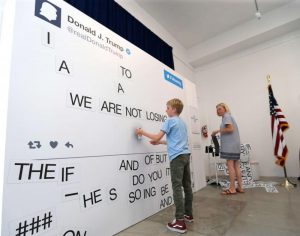When the leader of a nuclear-armed nation lobs a tweet bomb at another country, the world takes notice. When it’s the president of the United States, which has 6,550 available nuclear warheads, a tweet bomb has enormous explosive charge.
So it was with Donald Trump’s rather thuggish warning to his Iranian counterpart, Hassan Rohani, late on July 22. “NEVER, EVER THREATEN THE UNITED STATES AGAIN,” Trump said, “OR YOU WILL SUFFER CONSEQUENCES THE LIKES OF WHICH FEW THROUGHOUT HISTORY HAVE EVER SUFFERED BEFORE.”
Most of the tweet was in all caps, something the internet age knows how to decode. Trump’s message was a shouted communication, one that commands attention and demands immediate action.
What exactly did Trump want Iran’s president to stop doing? All the evidence points to Rohani’s address to diplomats in Tehran on July 22, in which he said the following: Americans “must understand that war with Iran is the mother of all wars and peace with Iran is the mother of all peace.”
Then, using rich imagery, a characteristic of Persian literature and sometimes of ordinary conversations in Farsi as well, Rohani conveyed a message to the United States or perhaps to Trump: “Do not play with the lion’s tail because you will regret it eternally.”
After Trump’s apoplectic fit — in all caps — Iranian Foreign Minister Mohammad Javad Zarif tweeted a response that was only partially capitalised. “COLOR US UNIMPRESSED,” he yelled back into the ether.
Then, Zarif dropped his virtual voice and lapsed into a relatively measured, sentence-case format: “We’ve been around for millennia & seen fall of empires, incl our own, which lasted more than the life of some countries.”
The three exchanges — two of which were on Twitter — say something about diplomacy today. First, the net positives: Twitter wars and tweet bombs are a whole lot better than a shooting war or the use of ordnance that can kill and maim.
That said, social media can hardly be called naturally emollient. By its very nature, such messages are public, pithy and generally punchy. Accordingly, social media are not particularly conducive to diplomatic dialogue. In the context of the Trump-Iran Twitter exchanges, they might even be downright dangerous. The escalation of threatening language at the highest level in both countries could provoke individual missteps that trigger a wider conflict.
As has been pointed out by US military officers, a single Iranian speedboat captain who interprets his president and foreign minister’s muscular talk literally could spark a crisis in the Strait of Hormuz. The American officers did not detail the effect of their own president’s threats on the mindset of US servicemen in Syria, not far from Iranian militia. Suffice it to say, there is always the chance something could go seriously wrong.
Much of social media’s pungent prominence in foreign diplomacy has been led by Trump. One might have expected politicians younger than the septuagenarian Trump to seize on Twitter to speak with immediacy and directness to foreign countries, their leaders and citizens. But it is Trump, just 18 months into his presidency, who has deployed social media as the primary tool of outreach to other nations.
Mostly, it hasn’t been diplomatic. Trumpisms, which have proliferated like weeds in the lowlands and highlands of social media foreign policy discourse, are irrepressible and supremely resistant to the scythe of precision, clarity and amity. They advance an agenda that might best be called alt-diplomacy. In fact, Trump’s all-caps tweet to the Iranian president may be a sign of a discernible shift in overt American presidential engagement with adversaries.
His trademark bellicose style lacks the bloodthirsty imagery employed by Iranians over decades of anti-American speechifying and it certainly has none of the flowery faux-Shakespearean insults and heaping curses routinely issued by the true masters of the art, North Korea. Pyongyang has a rich tradition of insults for real or perceived foes, though they are not relayed by social media in the first instance.
A good example is the official announcement of the December 2013 execution of Jang Song-thaek, uncle of North Korean dictator Kim Jong-un and once thought to have been the second-most powerful man in North Korea. Jang was described as “worse than a dog, a traitor to the nation for all ages… despicable human scum” and someone who indulged in “unpardonable thrice-cursed treason.”
In May 2014, North Korea described then US President Barack Obama as “a wicked black monkey” and someone who “still has the figure of a monkey while the human race has evolved through millions of years.”
Trumpian Twitter outbursts differ from North Korea’s fulminations in one other respect. For North Korea, they came from the state-controlled Korean Central News Agency. Trump’s tweets come from the US president’s personal account.
If push came to shove, North Korea’s leader could always deny responsibility for anything the news agency put out. Trump cannot. He is hoist with his own tweets.


